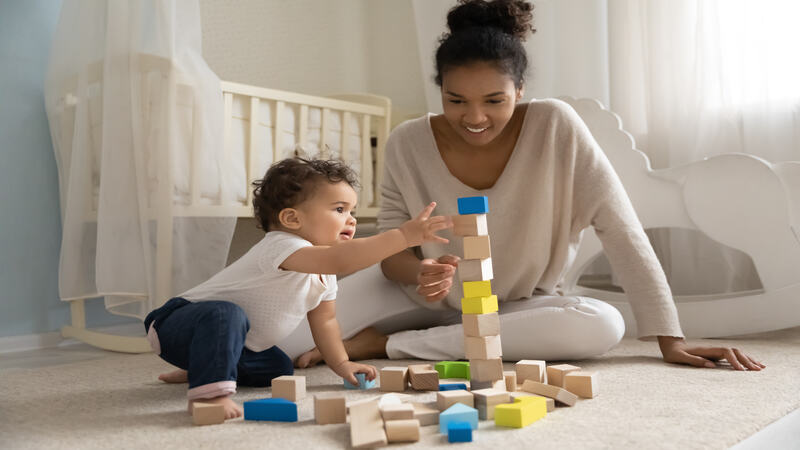 Constructive games like building blocks offer significant benefits to growing babies. Games such as building blocks for babies allow them to go beyond their limits to solve problems. The block games help to recognize different shapes, colors, and sizes. These educational toys set a deep learning foundation and improve logical thinking.
Constructive games like building blocks offer significant benefits to growing babies. Games such as building blocks for babies allow them to go beyond their limits to solve problems. The block games help to recognize different shapes, colors, and sizes. These educational toys set a deep learning foundation and improve logical thinking.
Continuous playing with such toys allows babies to find different ways to integrate with their surroundings and enhance motor skills. Let’s learn about the importance of building blocks for babies.
In This Article
- What Are Building Blocks?
- Are Building Blocks Good For Babies?
- When Should You Introduce Building Blocks To Babies?
- Benefits of Building Blocks For Babies
- Precautions to Take When Your Baby Is Playing With Building Blocks
- When Should You Stop Using Building Blocks?
- FAQ’s
What Are Building Blocks?
Building block toys are a form of solid shapes used for constructive playing. Some building blocks are made of wood, and others are fancier, similar to interlocking bricks made with plastic. These games are very powerful for babies to improve motor skills and learning capabilities. Some building blocks are made with rubber and foam, which are safe to play with. At the same time, some building blocks toys come with numbers and alphabets that are used for creative thinking.
Are Building Blocks Good For Babies?
Building blocks are like a learning tool. Your babies will love discovering different stacking and building different shapes. Not just for shapes, but they also learn about color contrast, sizes, and numbers. It helps to develop motor skills, spatial awareness, hand-eye coordination, and reasoning abilities.
When Should You Introduce Building Blocks To Babies?
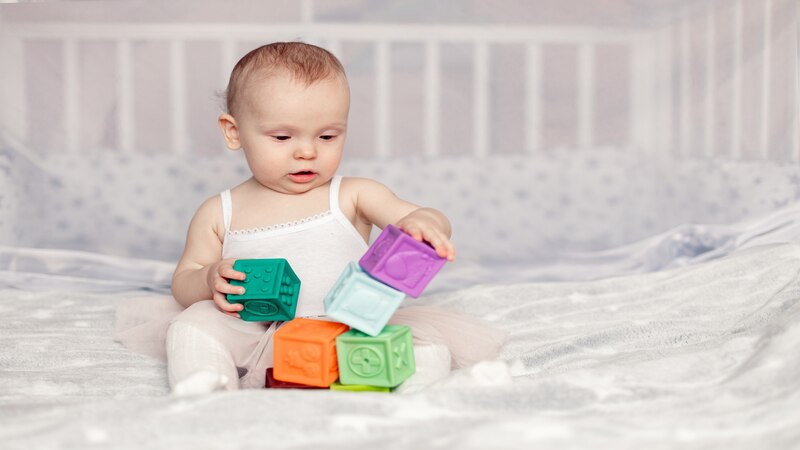
You can introduce building blocks once your baby is around 6 months of age. During this time, they may not able to stack the blocks one on top of another, but they will start exploring the pieces. feeling the texture and understandinging the concepts of shape and color. You may find your baby trying to put the block in their mouth and banging blocks against each other as a form of play. Once babies are able to sit, they do better with the blocks. The familiarity created with these toys so far will create intrigue and encourage babies to try and stack the pieces, especially if you show them how it is done.
But remember, babies may need to be at least a year old to try and stack these blocks as they are supposed to be. Usually most babies develop stacking capabilities between 12 and 18 months and even older. So, don’t worry or show impatience if your baby isn’t playing with the blocks as they are supposed to. Give them time to get comfortable with the blocks as a toy.
Benefits of Building Blocks for Babies
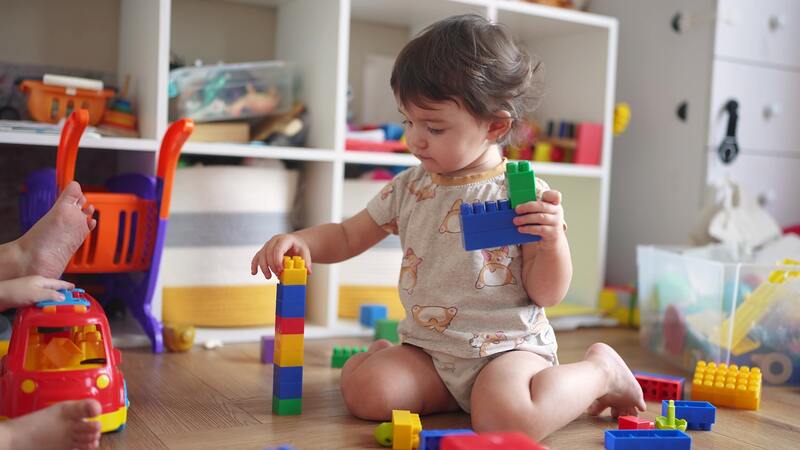
Babies will learn new things and learn to make different shapes. In addition to this, there are many benefits of introducing building blocks for babies, which are as follows.
1. Hand-Eye Coordination
During playtime with blocks, babies will use their eyes and hands to join those blocks. They try to figure out different shapes through their eyes and fingers. This helps to build a connection between sight and touch. Hence, with building block games, they learn about eyes and hand coordination.
They develop awareness about movements, eyes, and hands by picking up blocks of different shapes and stacking them on one another to build a structure. Moreover, with building block games, babies will learn to use their hands correctly by recognizing things with their eyes.
2. Gross and Fine Motor Skills
When babies are taking a shift to the next developmental stage, building blocks are a helping hand to strengthen their motor skills. The small muscular development in the finger and hands due to constructive play helps improve gross and fine motor skills. In addition, babies learn interlocking blocks to make the structure. This helps to build precision and skills essential to improving their learning capabilities.
3. Problem-Solving Skills
Construction or building block toys boost coordination between the hands and eyes of the babies. The interlocking and stacking nature of the game allows babies to determine different structures, shapes, and colors. While playing with building blocks, they compare different structures before building them. This enables them to think out of the box to build problem-solving skills.
4. Early Math Skills
Babies begin to think about early mathematics skills like adding, sizes, and shapes when they play with building blocks. They learn to count, name shapes, compare different sizes, and combine blocks of two shapes to make a new shape. As they play these kinds of games, their reasoning skills will be improved.
5. Enhances Logical Thinking
Building block games give liberty to your baby to think logically. They freely combine, destruct and re-combine the blocks in many ways to make impressive designs. These small activities not only improve creativity but also enhance logical thinking.
Precautions to Take When Your Baby Is Playing With Building Blocks
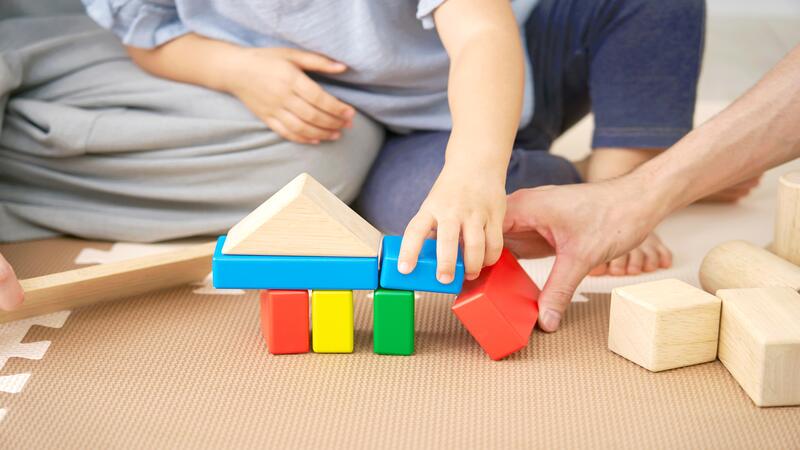
Now, as you know, building blocks are essential for babies. However, you need to follow some precautions to take when you are introducing building blocks to them. Let’s know these precautions.
- Always buy large foam-based blocks or plastic blocks in different sizes, shapes, and colors. They are safest to play and don’t get injured while playing games.
- Card blocks of wooden blocks are suitable for older kids above 4 yours.
- Buy simple blocks that are easy to construct. Then, as your baby grows and learns to play with building blocks, you can introduce complex sets.
- Read warning signs and instructions on the packaging of building block toys.
- Purchase only age-related building blocks games
- Avoid purchasing building blocks with rigid points and sharp edges.
- Do not buy building blocks with small parts as they can choke hazards for growing kids.
When Should You Stop Using Building Blocks?
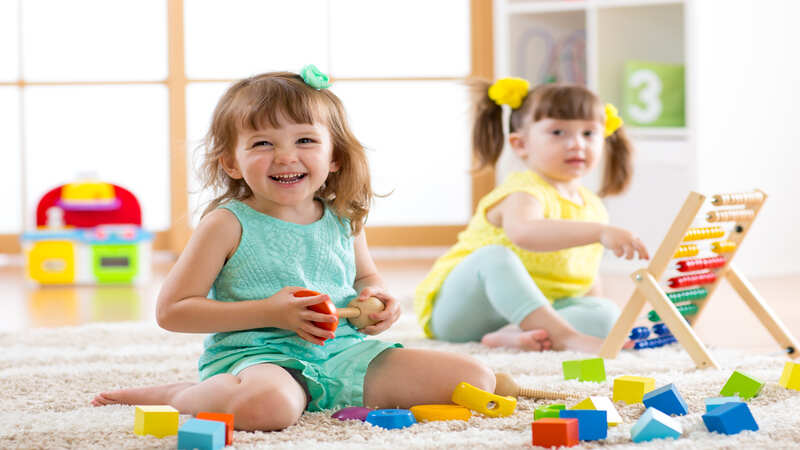
There is no age limit for babies to play with building blocks. Your little one can continue playing with building blocks after reaching 3 years or even 7. This is the growing time of the babies when they learn about different things and develop reasoning abilities. So, you can let them play with building blocks for at least five years of age.
Building blocks for babies are beneficial for their motor skills and thinking capacities. Hence, it is recommended to introduce basic simple building block games when they reach the age of 6 months. First, help them learn about shapes and structure. Then, you can play with them to make them understand stacking so they can play independently.
FAQ’s
1. How do Building Blocks Help in The Physical Development of Babies?
Building blocks help to enhance the fine motor skills that help babies to manipulate shapes and position them correctly on the blocks.
2. What Are The Learning Outcomes of Building Blocks?
Building blocks help to develop skills in understanding shapes, colors, and even numbers. Building blocks teach problem solving skills and mathematical skills to babies.
3. My Baby is 16 Months Old, so Should I Allow Them to Play With These Building Blocks?
Yes, this is the perfect time to introduce building blocks. But be sure to use simple puzzles and plastic for foam-based building blocks.

